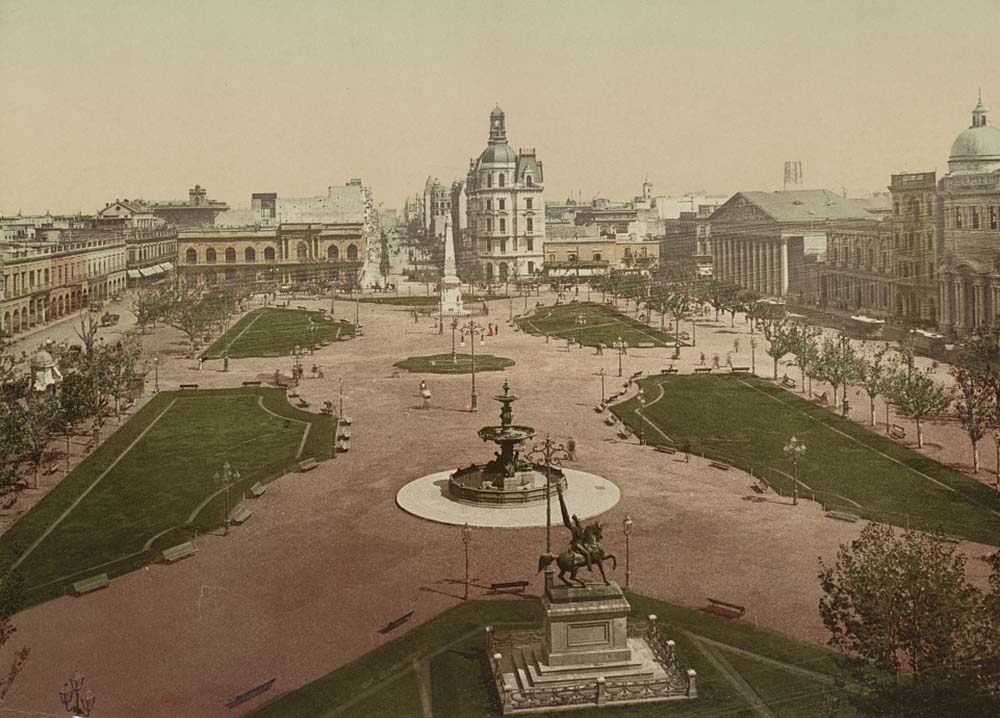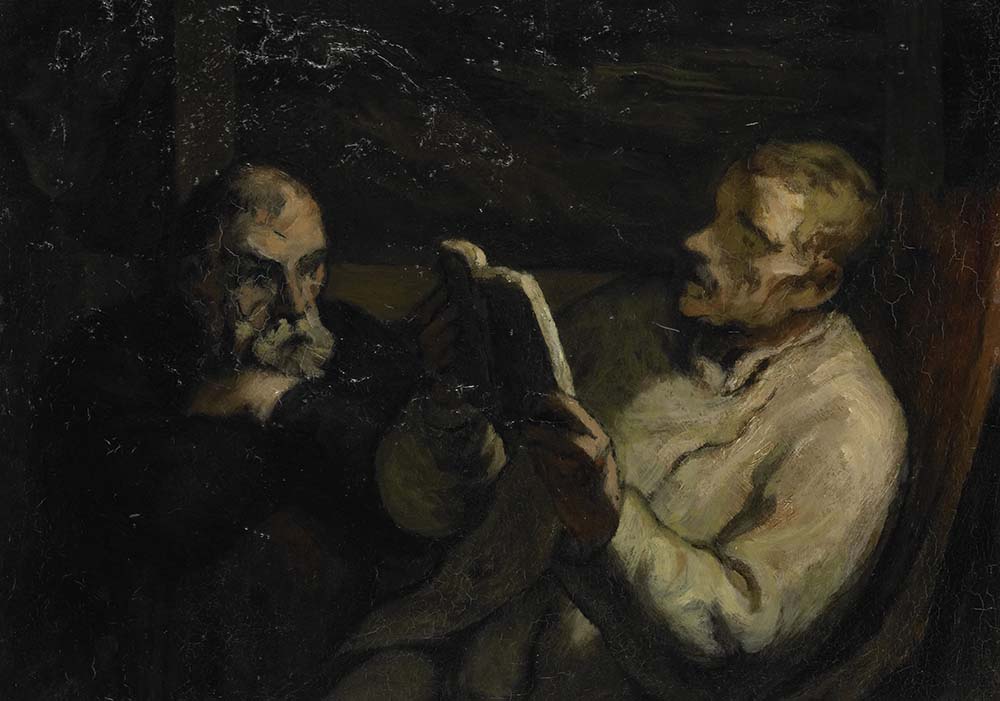“I think the happiness of a reader is beyond that of a writer, for a reader need feel no trouble, no anxiety: he is merely out for happiness,” Jorge Luis Borges said in a 1968 lecture. “And happiness, when you are a reader, is frequent.” This pleasure did not always arrive with a novel, he explained in his 1970 New Yorker essay “Autobiographical Notes”: “In the course of a lifetime devoted chiefly to books, I have read but few novels, and, in most cases, only a sense of duty has enabled me to find my way to their last page.” The critic Jason Wilson calls Borges’ reading habits “hedonistic,” noting that he found novels “tedious, packed with irrelevant detail and information.”
Yet Borges did not eschew longer fiction as a child, when he read through the whole of his family’s collection of English and Spanish books. He was taught to read Spanish by his mother and taught English by his paternal grandmother, Fanny Haslam. Haslam was born in Staffordshire, England, and moved to Argentina as a young woman, following her elder sister, whose Italian husband immigrated to Argentina to work on the nation’s first horse-drawn streetcars.
Borges’ grandmother read English passages to him from what he called a “leccionario” (combining the Spanish words for “dictionary” and “lesson”), a collection of extracts from classic works by European authors. In a 1927 essay for the Argentine newspaper La Prensa, he described his youthful open-mindedness toward reading, before the development of his critical faculties:
I suspect that the detective novels of Eduardo Gutiérrez and a volume of Greek mythology and The Student of Salamanca and the reasonable and not at all fanciful fantasies of Jules Verne and Stevenson’s grandiose romances and the first serial novel ever written, The Thousand and One Nights, are the greatest literary joys I have experienced…I was a hospitable reader in those days, a polite explorer of the lives of others, and I accepted everything with providential and enthusiastic resignation. I believed everything, even errata and poor illustrations. Each story was an adventure, and I sought worthy and prestigious places to live it: the highest step of a staircase, an attic, the roof of the house.
Borges suffered from hereditary blindness and was unable to read by 1955, at age fifty-five. He never learned Braille, instead relying on assistants, including his mother, to read to him. In 1985 the Argentine publisher Hyspamerica invited Borges to select one hundred of his favorite books and write introductions for new editions of them. They called the collection “A Personal Library.” At least twenty-eight novels made it on the list, suggesting that Borges’ preference for short fiction didn’t preclude him from appreciating and recommending some of the novels he did read. Borges’ introductions were his final writing project, left incomplete when he died in 1986. Below are a few of the writers Borges selected and others that he enjoyed during a life spent pursuing literary pleasure.
James Joyce
Borges claimed in a 1925 review in Proa, the Argentine literary magazine he cofounded in 1922, that he was “the first traveler from the Hispanic world to set foot upon the shores of Ulysses.” He was given an English copy by the poet Ricardo Güiraldes in 1923; a Spanish translation did not appear until 1945. Borges confessed in his review that he had not “cleared a path through all seven hundred pages,” which didn’t stop him from admiring the “total reality” Joyce had created. He ultimately admitted to finding the novel’s timescale to be overwhelming: “If Shakespeare—to use his own metaphor—invested in the turning of the hourglass the exploits of many years, Joyce inverts the procedure and unfolds his hero’s single day into many days upon the reader. (I haven’t said many naps.)”
Borges did not enjoy Finnegans Wake, which he also did not finish, writing in a 1939 review for the Argentine magazine El Hogar, “I have examined it with some bewilderment, have unenthusiastically deciphered nine or ten calembours, and have read the terror-stricken praise in the Nouvelle Revue Française and the Times Literary Supplement.” When Joyce died two years later, Borges reflected on his singular literary style and the joys of rereading snippets of Ulysses in an essay for the literary magazine Sur:
Like Shakespeare, like Quevedo, like Goethe, like no other writer, Joyce is less a man of letters than a literature. And, incredibly, he is a literature within the compass of a single volume. His writing is intense, as Goethe’s never was; it is delicate, a virtue whose existence Quevedo did not suspect. I (like the rest of the universe) have not read Ulysses, but I read and happily reread certain scenes: the dialogue on Shakespeare, the Walpurgisnacht in the whorehouse, the questions and answers of the catechism: “They drank in jocoserious silence Epps’ massproduct, the creature cocoa.” And, on another page: “A dark horse riderless, bolts like a phantom past the winningpost, his mane moonfoaming, his eyeballs stars.”
Adolfo Bioy Casares
Borges became friends with the Argentine writer Adolfo Bioy Casares in the early 1930s, when Bioy Casares was still a teenager. They began collaborating a few years later, often employing the pseudonyms Honorio Bustos Domecq, B. Suárez Lynch, or B. Lynch Davis, which they derived from the names of deceased ancestors. Borges described their partnership in “Autobiographical Notes.”
He and I attempted many different literary ventures. We compiled anthologies of Argentine poetry, tales of the fantastic, and detective stories; we wrote articles and forewords; we annotated Sir Thomas Browne and Gracián; we translated short stories by writers like Beerbohm, Kipling, Wells, and Lord Dunsany; we founded a magazine, Destiempo, which lasted three issues; we wrote film scripts, which were invariably rejected. Opposing my taste for the pathetic, the sententious, and the baroque, Bioy made me feel that quietness and restraint are more desirable.
Bioy Casares married the poet and painter Silvina Ocampo in 1940, with Borges as their witness. In the same year Bioy Casares published his best-known work, The Invention of Morel. Borges wrote an introduction for the novel, which tells of a scientist’s attempt to preserve the perfect day; his sister, the artist Norah Borges, provided illustrations.
For Borges, The Invention of Morel proved that not all contemporary authors wanted to write plotless, “realist” novels about people’s emotional lives. Despite literary critics’ assertions to the contrary, the early twentieth century was a golden age for complex narratives, as he told Bioy Casares’ readers: “During no other era have there been novels with such admirable plots as The Turn of the Screw, The Trial, Le voyageur sur la terre, and the one you are about to read.”
Lord Halifax’s Ghost Book
From 1936 to 1939 Borges edited a biweekly page on “Foreign Books and Authors” for the magazine El Hogar. His eclectic reading tastes shaped his reviewing selections, which rarely included best-selling books. In Jorge Luis Borges: A Literary Biography, critic Emir Rodríguez Monegal recalls picking up a 1936 issue in which Borges reviewed “a book of songs from the Mississippi, an Ellery Queen detective novel, a novel by Henry de Montherlant, a reissue of a study of neurotic writers by Arvède Barine.”
Also in 1936 Borges wrote about Lord Halifax’s Ghost Book, a collection of ghost stories by Charles Lindley Wood, 2nd Viscount Halifax. Wood’s class snobbery—he relied on his well-to-do friends to furnish firsthand tales of paranormal experiences—tempered Borges’ enjoyment of the book’s demonstration of the “charms of superstition.”
Lady Goring, Lord Desborough, Lord Lytton, the Marquis of Hartingdom, and the Duke of Devonshire are among the names whose rest has been troubled…The Honorable Reginald Fortescue became a firm believer in the existence of “an alarming specter.” As for myself, I don’t know what to think: for the moment, I refuse to believe in the alarming Reginald Fortescue until an honorable specter becomes a firm believer in his existence.
Virginia Woolf
Victoria Ocampo, Silvina’s sister and publisher of the literary magazine Sur, commissioned Borges to translate Virginia Woolf’s A Room of One’s Own in 1934; a request for a translation of Orlando soon followed. In a biographical sketch for El Hogar, he characterized the latter as Woolf’s “most intense” work, “one of the most singular and maddening of our era.” He continued, “Magic, bitterness, and happiness collude in this book. It is also a musical work, not only in the euphonious virtues of its prose but in the structure of its composition, which consists of a limited number of themes that return and combine.” Woolf’s 1931 novel The Waves was, to Borges, another noteworthy experiment in narrative structure (and apparently an exception to his preference for well-structured plots): “There is no plot, no conversation, no action. Yet the book is moving. Like the rest of Virginia Woolf’s work, it is weighted with delicate, physical facts.”

Dante Alighieri
Borges’ first full-time job—acquired at the age of thirty-eight—was as an assistant librarian at the Miguel Cané Municipal Public Library, where he worked from 1937 to 1946. He read during his commute via streetcar from the city’s northern suburbs. In a 1977 lecture, the penultimate of seven talks he gave at the Teatro Coliseo in Buenos Aires that summer, he described one memorable choice of reading material: John Aitken Carlyle’s translation of The Divine Comedy by Dante Alighieri.
Chance—except that there is no chance; what we call chance is our ignorance of the complex machinery of causality—led me to discover three small volumes in the Mitchell Bookstore (now gone—it brings back many memories). Those three volumes…were the Inferno, the Purgatorio, and the Paradiso, in the English version by Carlyle (not Thomas Carlyle). They were very handy books, published by Dent. They fit into my pocket. On the left was the Italian text, and on the right a literal translation. I devised this modus operandi: I first read a verse, a tercet, in the English prose; then I read the verse in Italian; and so on through to the end of the canto.
“The truth is that I don’t know Italian,” Borges explained. “I only know the Italian Dante taught me, and later Ariosto, when I read Orlando Furioso.” He eventually lost his post at Miguel Cané for publicly supporting the Allied powers during World War II—a stance Juan Perón’s government regarded as hostile to Perón’s rule.
Murasaki Shikibu and Miguel de Cervantes
“I ought to have studied the Oriental languages,” Borges said in 1977. “I have only glanced at them through translations. But I have felt the punch, the impact of their beauty.” Like W.B. Yeats and Ezra Pound, he enjoyed Arthur Waley’s translations of classic Japanese and Chinese texts, calling Waley “one of the very few Sinologists who is also a man of letters.” In 1938 he reviewed for El Hogar Waley’s translation of Murasaki Shikibu’s eleventh-century epic novel The Tale of Genji. He rebuffed English-speaking readers who might come to the text seeking “exoticism—that horrible word.” No European writing before the nineteenth century could match the elegance of Murasaki’s prose and her insight into human psychology, claimed Borges, explaining,
This is not to say that Murasaki is more intense or more memorable or “better” than Fielding or Cervantes; rather that she is more complex, and the civilization to which she belonged was more refined. To put it another way: I don’t claim that Murasaki Shikibu had the talent of Cervantes, but rather that she was heard by a public that was far more subtle. In the Quixote, Cervantes limits himself to distinguishing day from night; Murasaki (“The Bridge of Dreams,” chapter X) notes in a window “the blurred stars behind the falling snow.” In the previous paragraph, she mentions a long bridge, damp in the mist, “that seems much farther away.” Perhaps the first detail is implausible; the two together are strangely effective.
Around the same time Borges reviewed The Tale of Genji, he published “Pierre Menard, Author of the Quixote,” a story about a fictional French writer trying to rewrite Don Quixote in the twentieth century. Despite the differences between modern France and sixteenth-century Spain, Menard believes he can acquire the same skills and experiences that allowed Cervantes to originally create the book. “Menard’s method was to be relatively simple,” Borges writes. “Learn Spanish, return to Catholicism, fight against the Moor or Turk, forget the history of Europe from 1602 to 1918—be Miguel de Cervantes.”

Old English Poetry
As Borges’ eyesight deteriorated, he became more interested in Old English and Old Norse poetry, compositions intended to be recited rather than read. In 1955 he began teaching English and American literature at the University of Buenos Aires, where he found willing study partners in his undergraduate students. He recounts in “Autobiographical Notes” how he proposed a weekly reading group at the end of a semester.
I knew that at home, on a certain top shelf, I had copies of Sweet’s Anglo-Saxon Reader and the Anglo-Saxon Chronicle. When the students came the next Saturday morning, we began reading these two books. We skipped grammar as much as we could and pronounced the words like German. All at once, we fell in love with a sentence in which Rome (Romeburh) was mentioned. We got drunk on these words and rushed down Peru Street shouting them at the top of our voices.
The Sagas and the Eddas
After learning Old English, Borges moved on to Old Norse and Icelandic. For a 1976 essay in The New Yorker he discussed kenning metaphors, the compound phrases that replace simple nouns in Old Norse and Old English poetry (e.g., “battle-icicle” stands in for “drop of blood”). “In England, poets came to feel that such figures of speech were burdensome,” Borges writes. “Not so with the skalds, the Scandinavian court poets. They thought that if the ship is the stallion (or the stag or the bison) of the sea, and the sea is the whale’s road, why not call the ship the stallion of the whale’s road?”
Some skaldic poets delighted in crafting lengthy metaphors, attaching up to six or seven separate phrases in a single kenning. Borges commented on several kennings from the thirteenth-century Egil’s Saga, when the narrator is mourning his younger brother’s death in battle:
The dyers of the wolf’s fangs
squandered the red swan’s meat.
The hawk of the sword’s dew
fed on heroes in the field.
The serpents of the Vikings’ moons
fulfilled the will of the irons.
For Borges, “the meaning is irrelevant, the suggestion of little value.” One should appreciate a kenning on different terms than those of modern figurative language: “They neither stir the imagination nor call up images or emotions…Their pleasure—their sufficient pleasure—lies in their variety, in the unexpected linking together of the words.”
Encyclopedia Britannica
Borges was appointed director of the National Library in 1955 after Perón was deposed by a military junta. Despite knowing the new government chose him “for reasons more political than literary,” he was still delighted by the appointment, he said in a 1977 lecture. Yet by the time he assumed his position, he could no longer see well enough to read. He describes his reaction:
Little by little I came to realize the strange irony of events. I had always imagined paradise as a kind of library. Others think of a garden or of a palace. There I was, the center, in a way, of nine hundred thousand books in various languages, but I found I could barely make out the title pages and the spines…Those two gifts contradicted each other: the countless books and the night.
In the same lecture Borges recalled visiting the library as a child with his father. Too shy to request books from the librarians, he browsed volumes of the Encyclopedia Britannica sitting on the open shelves. His practice was to choose a volume at random, a method that did not guarantee results: “I remember one night when I was particularly rewarded, for I read three articles: on the Druids, the Druses, and Dryden—a gift of the letter dr. Other nights I was less fortunate.”
During Borges’ childhood, the library’s director was the French-born Argentine writer Paul Groussac, who also progressively lost his eyesight. “We were both men of letters,” Borges said of Groussac, “and we both passed through the library of forbidden books—one might say, for our darkened eyes, of blank books, books without letters.”
For another writer’s recommendations, see “A Walt Whitman Reading List.” “For a time, I thought of Whitman not only as a great poet but as the only poet,” Borges wrote in “Autobiographical Notes” of his experience reading Leaves of Grass as a teenager. “In fact, I thought that all poets the world over had been merely leading up to Whitman until 1855, and that not to imitate him was a proof of ignorance.”
See the other entries in our reading list series: Julia Ward Howe, Willa Cather, Virginia Woolf, Frederick Douglass, Sylvia Plath, Theodore Roosevelt, Nella Larsen, Flannery O’Connor, and Emily Dickinson.
